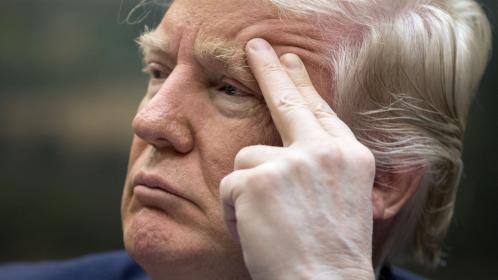
Trump has more to offer than mud, debt and fears
The president’s healthcare reform and his radical budget: RIP. And with them perhaps the era of the Donald.
The man who thought he had engineered a hostile takeover of the Republican party found out last week that he hasn’t. Unless Donald Trump has learnt that lesson, and learning unpleasant lessons is not his long suit, we may be seeing the beginning of the end of the Trump phenomenon. That end could come next year if he loses control of the Senate, and even possibly the House.
Restructuring the healthcare system has long been a goal of presidents. Harry Truman tried and failed in 1945. Bill Clinton tried to push through Hillarycare in 1993, before retreating. Barack Obama tried – and succeeded. The number of people receiving health insurance rose, but Obamacare, as constructed, proved unsustainable. Among other things, it guaranteed cover to people with pre-existing conditions at premiums that did not reflect the risk to the insurer. That drove up premiums, but not enough to prevent insurers from withdrawing from offering policies in many areas. Health insurance in America can be confusing for those on the outside looking in, as well as those who are dealing with it. There are many things that people need to think about when deciding on their insurance. Over 65s may opt for Medicare and check out the Medicare Supplement Plan N to see what else they can add to their insurance and if that will help them in the long-run, but it depends on the individual.
Obama did, though, succeed in his main objective: changing the attitude of Americans. Most now believe that access to affordable insurance is an entitlement. That is making it extraordinarily difficult for Trump to redeem the Republican campaign pledge to “repeal and replace” Obamacare. He deserves credit for not standing aside and letting Obamacare implode, which would have given him a freer hand in shaping a new system.
Bound by arcane procedural rules, and led by speaker Paul Ryan, the House decided to tackle the job in three steps. Out came a bill, down went the president’s popularity, and with it any notion he might have had that the Republican party has a new owner – him. Promising that all would come right when it ascended steps two and three, Ryan and the president removed Obamacare’s capital gains taxes on the rich, and freed young people of the requirement to buy insurance.
Alas, in the short run – the time period of relevance to politicians who see next year’s elections as ordinary people see tomorrow – that and other changes would result in higher premiums for the older, poorer, rural Americans who make up a large part of Trump’s core support, and less money to subsidise insurance purchases and fund Medicaid (which helps people too poor to afford insurance).
Worst of all, the Congressional Budget Office (CBO) reckons that the new plan – Ryan calls it Trumpcare, Trump calls it Ryancare – could increase the number of people without health cover by 24m by 2026. Never mind that it would also reduce the budget deficit by a hefty $337bn over the same period – that’s mere money, whereas uninsured Americans are real people with medical needs that make compelling stories on television.
Experts such as the Manhattan Institute’s Diana Furchtgott-Roth note that CBO estimates have been wildly inaccurate in the past and that markets will respond with attractive alternatives in the long run.
The healthcare mess is also affecting Trump’s budget plans, revealed in part last week for the 27% of the total devoted to what is called discretionary spending. Proposed rises in spending on defence (more soldiers, marines and ships as the administration shifts from soft to hard power), veterans, homeland security (including the Mexico wall) and school choice are to be funded by swingeing cuts in cash for the Environmental Protection Agency (-31%), State Department (-29%) and agriculture and labour departments (-21% each), with double-digit percentage cuts for six other agencies.
Also, not a thin dime will be spent on initiatives and research linked to climate change; partnerships with foreign health research institutes; programmes that help low-income seniors find work, or support the arts; or on 19 agencies, from the Institute of Peace to African Development Foundation. If Trump has his way.
Which he won’t. Any slim chance he had of strong-arming congressmen to support this very radical and much-needed reallocation of the nation’s financial resources disappeared when Republicans in Congress declined to add the beneficiaries of programmes slated for cuts to those already angry at Obamacare.
Until now, Democrats were worried that many of their Senate candidates, running in states that Trump carried last year, would lose their re-election bids. Now, Chuck Schumer, the New York senator who is minority leader, sees that as a real advantage. By next year, Trump supporters will be paying more for insurance or unable to secure it at an affordable rate, and many will have seen their favourite programmes gutted in the Trump budget.
A poll shows his approval rating, never high, fell to 39% from 42% last weekend. At this early stage in a president’s term, approval ratings are usually in the 50%-60% range.
Republican legislators may amend the bill that Trump is asking them to support, but the damage is done. They have let the president know that:
• he will be on his own when he attempts to push through his tax reform bill;
• they will not support raising tariffs on America’s trading partners; and
• they are not prepared to run up deficits to fund an infrastructure plan in an economy so close to full employment that the Federal Reserve has finally set about raising rates.
But there may still be much to play for. Trump is on the right track in trying to roll back the regulatory state; his supporters are pleased with his choice to fill a Supreme Court vacancy; the healthcare and budget fights have only just begun. Best of all, the Democrats have nothing to offer voters except mud (for slinging), debt and fears. Hillary Clinton proved that elections are not won, but lost. Trump may be blessed in 2020 with an inept opponent from the rising hard left of the Democratic party.






